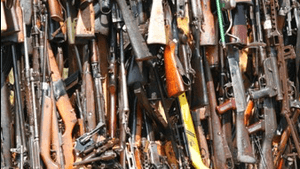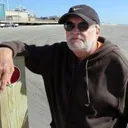Stay in the Loop
BSR publishes on a weekly schedule, with an email newsletter every Wednesday and Thursday morning. There’s no paywall, and subscribing is always free.
From Camden to Orlando: A legacy of mass murder
Howard Unruh: the first U.S. mass murderer

For me, the horror in Orlando’s Pulse nightclub recalled another, long ago mass murder. I was 11 years old in the leafy Camden suburb of Collingswood, New Jersey. It was September 6, 1949, and in the Cramer Hill section of Camden a World War II veteran, Howard Unruh, 28, left his house at 9:20 in the morning for what became known as “The Walk of Death,” a stroll of 12 minutes during which he killed 13 people — three of them children — with a souvenir Luger.
That made Unruh the first American mass murderer. He wouldn’t be the last as this brand of insanity seems to be as American as apple pie. To those who champion access to weapons capable of carrying out mass murder, that access is an irredeemable right, and one worth dying for.
Death comes knocking
To this child, Unruh’s rampage was at first an abstraction. I listened to reports on the radio because we didn’t have a television. My father sold what were called “mills supplies”: cables, belts, heavy lubrication oils. When he pulled into the driveway at noon and came into the house, severely shaken, Unruh’s murders became very real.
My father’s first sales call that morning was to have been in Unruh’s East Camden neighborhood at about the time the shootings occurred. As fate would have it, his sales manager changed the appointment just before my father left the office. He stayed home the rest of the day. He always said it was like missing a plane that crashed.
My father grew up in Camden and knew a lot of the cops involved in the shootout with Unruh after he barricaded himself in his mother’s house, she having fled after Howard threatened her with a wrench before leaving on his spree.
The brave and the babies
My father was something of a raconteur and one of his stock stories was about Stoney McGlinn, a Camden detective who was one of the 60 police who traded shots with Unruh before he surrendered. As my father told it, Stoney was as crazy as Unruh, sticking his head around a window sill to taunt Unruh to draw his fire so the cops could get a decent shot at him.
Unruh was deemed too mentally unstable to stand trial and was committed to what is now Trenton Psychiatric Hospital where he died in 2009 at the age of 88.
Two of the people killed by Unruh on that blasted morning were a barber, Clark Hoover, 33, who was cutting the hair of six year old Orris Martin Smith. Smith was sitting on one of those little horses they had for kids in barbershops back then. Unruh shot them through the barber shop window, allowing for the deflection. He had a shooting range where he practiced in his mother’s basement. He became very good with that Luger. Unruh knew from death; he was a tanker at the Battle of the Bulge.
Limited only by his Luger's magazine
Besides my father's close call, I had other connections, some close, some distant, to the first U.S. mass murderer. Unruh had gone to Cramer East High School in East Camden; I was a substitute teacher there the day John F. Kennedy was shot.
My most personal connection to Howard Unruh was through my sister. Ellen is a retired detective with the Camden County Prosecutor’s Office. At one point, many years ago, Unruh’s mother, Freda, petitioned the courts for her son to be moved from Trenton Psychiatric Hospital to a facility closer to Camden to make her visits easier because she didn’t drive.
My sister and another detective were dispatched to bring Unruh for the hearing in a Camden courtroom. They transported him, fully shackled, in a plain county sedan. There was no barrier between the front and back seats, but my sister remembers that he was too medicated to be much of a threat. Cops are masters of black humor, and my sister says that during the one-hour ride, she and the other detective told Unruh that they were going to sell Unruh beanies with little propellers on top. Doped up as he was, she said he laughed a little at the idea. When his mother was mentioned, though, my sister said he tightened his lips in silence. He had said many times that, given the chance, he would kill his mother.
Unruh once told a psychiatrist that he would have killed a thousand people if he had enough bullets. The judge at the hearing said he would always be dangerous and sent him back to Trenton.
So, now there are 49 dead in Orlando, another 52 injured. Unruh would no doubt be pleased with his legacy.
Sign up for our newsletter
All of the week's new articles, all in one place. Sign up for the free weekly BSR newsletters, and don't miss a conversation.

 Bob Ingram
Bob Ingram